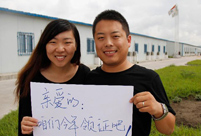 Turnip sculptures amaze tourists in Qingdao
Turnip sculptures amaze tourists in Qingdao Chinese ship formation conducts live fire training in West Pacific
Chinese ship formation conducts live fire training in West Pacific
 China comes in third at figure skating team event
China comes in third at figure skating team event
 China's teenager skater Yan shines at his Olympic debut
China's teenager skater Yan shines at his Olympic debut
 Taiwan-born actor stars on US TV series
Taiwan-born actor stars on US TV series
 Chinese Lunar New Year gift from abroad
Chinese Lunar New Year gift from abroad Chinese champions of Winter Olympic Games
Chinese champions of Winter Olympic Games  Zhang Yimou fined 7.48 mln for over-production
Zhang Yimou fined 7.48 mln for over-production
 Top 10 timeless female Chinese stars
Top 10 timeless female Chinese stars
SEOUL, Feb. 12 -- South Korea's second Antarctic research station officially opened on Wednesday, making it the 10th country to operate more than one year-round stations in the Antarctic, South Korea's ministry of oceans and fisheries said on Wednesday.
The Jang Bogo Station, named after a renowned admiral in Silla period, has been completed after 21-month construction. It located in Terra Nova Bay(E74 37) in Victoria Land, the southeastern tip of the Antarctic, some 4,500 km apart from South Korea's first Antarctic station King Sejong.
A dedication ceremony was held at the new station at 10:00 AM local time, attended by around 300 people. South Korean President Park Geun-hye sent a congratulatory video message to the ceremony, saying Antarctica was a key region that South Korea must trailblaze to expand their science and resources territory.
The station, which measures 4,458 square meters with 16 buildings of research laboratories, living quarters, power house and 24 observational and other facilities, is able to accommodate 15 people in winter and up to 60 in summer, according to the ministry.
Jang Bogo station was built and will be operated by making full use of eco-friendly construction materials and green renewable energy such as solar and wind energy. The aerodynamics design enables the station to fight the temperature of 40 degree below zero and 65 meter per second wind.
South Korea unveiled the Jang Bogo project and conducted the first site survey in 2006, aiming to build a new year-round station in the southeastern part of the Antarctic. The country's King Sejong Station is located on King George Island in the western part of the Antarctic.
The ministry said King Sejong station will remain a key sentinel station for monitoring the marine environment and investigation of the coastal ecosystem, while Jang Bogo station will serve as a base camp for continental research such as glaciology, meteorite studies and polar technology.
The new station will also be opened for scientists around the world to do cooperative scientific research, according to the ministry.
"I expect that with the full operation of Jang Bogo station, South Korea will not only conduct the polar research on its own initiatives with assistance of its own, but will also engage in jointly research with other advanced partners thereby, taking South Korea' s polar research to the next level, " said Kim Yangsoo, Director General for South Korea' s Marine Industry Policy Bureau.
 Special Coverage: Sochi Winter Olympic Games
Special Coverage: Sochi Winter Olympic Games  A day of a female high-speed train chief attendant
A day of a female high-speed train chief attendant New Year greetings from Chinese nationals in Africa
New Year greetings from Chinese nationals in Africa PLA navy conducts landing drills in South China Sea
PLA navy conducts landing drills in South China Sea  Blind date fair in Hangzhou
Blind date fair in Hangzhou  Highlights of Chinese New Year celebrations around the world
Highlights of Chinese New Year celebrations around the world  How do the Chinese spend their money during Spring Festival?
How do the Chinese spend their money during Spring Festival? 'Milk Tea' girl hosts Spring Festival gala of universities in U.S.
'Milk Tea' girl hosts Spring Festival gala of universities in U.S.  Brave mother fights cancer, enjoys Spring Festival with her triplets
Brave mother fights cancer, enjoys Spring Festival with her triplets President Xi attends opening ceremony of Sochi Winter Olympics
President Xi attends opening ceremony of Sochi Winter Olympics Highlights of opening ceremony of Sochi Winter Olympic Games
Highlights of opening ceremony of Sochi Winter Olympic Games Snowscape in Chinese New Year
Snowscape in Chinese New Year Interesting horse figures in life
Interesting horse figures in life  Top 20 most beautiful Chinese stars
Top 20 most beautiful Chinese stars  Top 10 Chinese films in 2013
Top 10 Chinese films in 2013Day|Week|Month